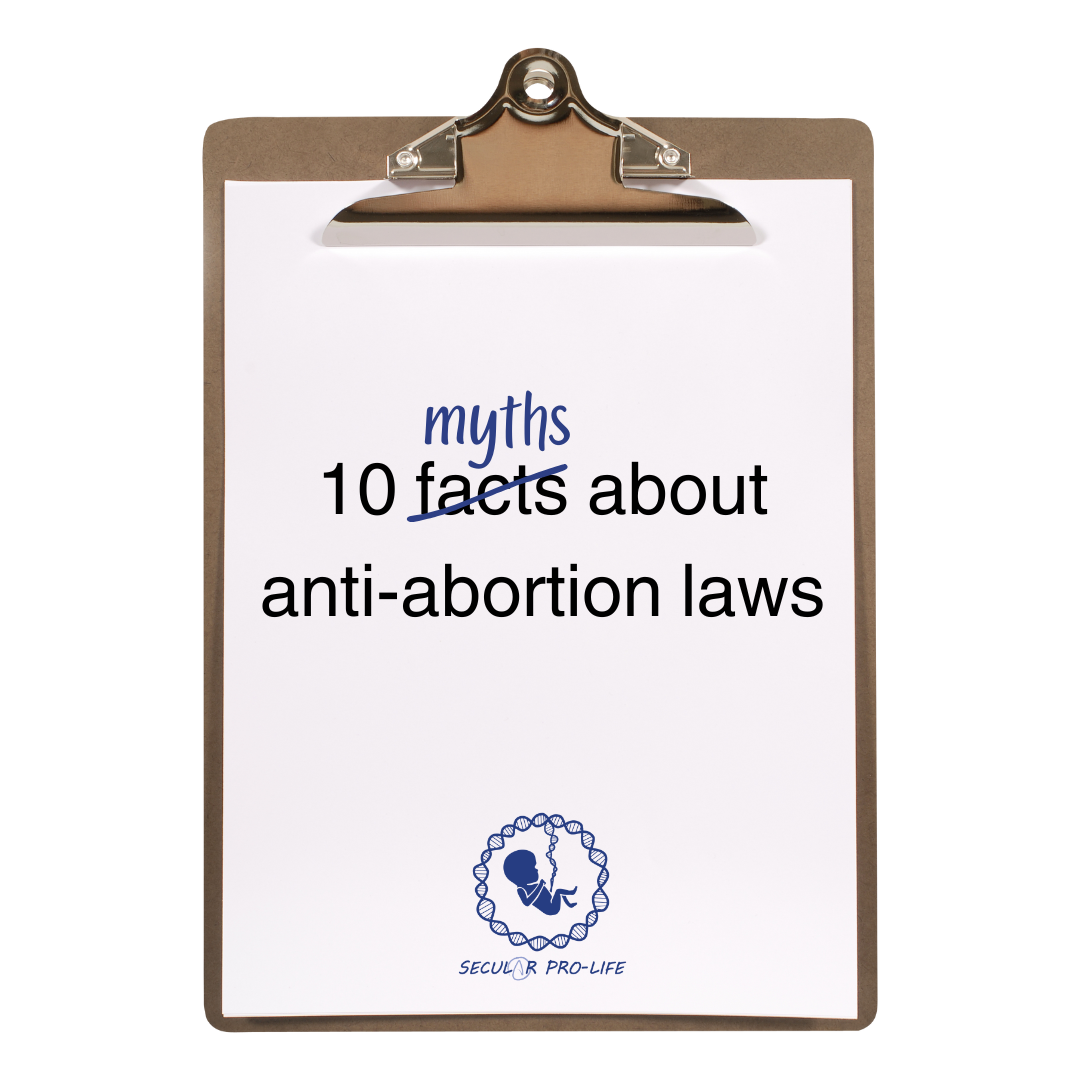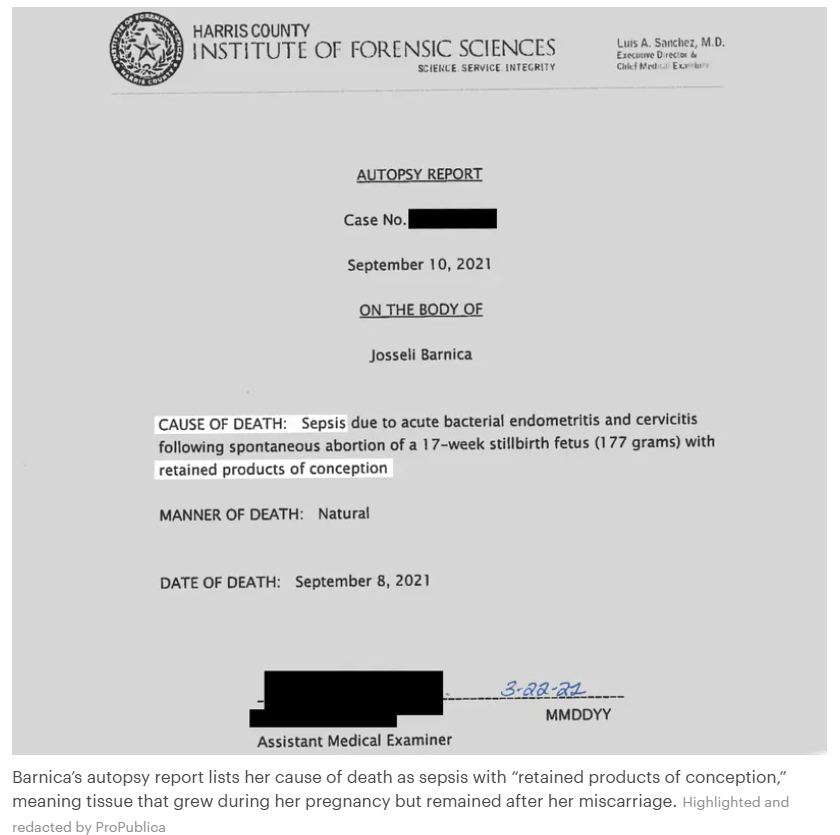10 myths about anti-abortion laws
The below blog post is also available as a recording here:
Gallup finds the public’s trust in the media is at an all time low. And it should be. Since Dobbs the bias and duplicity of journalists has increased seemingly without limit.
SPL followers ask us to parse truth from fiction in the news all the time. Below are 10 myths about anti-abortion laws we’ve debunked.
(Unfortunately our resources are such that we can research and respond to only a small proportion of the requests. If you’d like to increase our abilities, consider donating.)
Myth 1: Anti-abortion laws don’t decrease abortions.
Claim: Total abortion numbers have increased since Dobbs, which implies abortion restrictions don’t decrease abortions and may even paradoxically increase abortions.
Reality: Total abortion numbers result from multiple factors. Abortions have been increasing annually in the United States since 2017 (years before Dobbs), in part due to the expansion of abortion pills and telemed abortions. These numbers likely would have increased even more absent the pro-life laws so many states have passed since Dobbs. Other data indicate states with pro-life laws see increases in birth rates compared to states with lax abortion regulations.
Related:
Mississippi sees increase in births from abortion ban
Notre Dame professors lie about abortion in an op-ed complaining about lies about abortion
WeCount says abortions increased after Dobbs. What does this mean?
Did Dobbs make any difference? Guttmacher reports over 1M abortions in 2023
Research on abortion laws and abortion rates
Myth 2: Idaho hospital stopped providing L&D services because of anti-abortion law.
Claim: An Idaho hospital closed its labor and delivery unit because of the state’s anti-abortion law.
Reality: An Idaho hospital closed its labor and delivery unit because it didn’t have enough patients to afford the department anymore. The county’s population has overall aged and they’ve seen decreasing deliveries at the hospital for years, well before Dobbs.
Related:
Idaho hospital ends L&D services due to decreasing patient volumes; media blames abortion bans
Myth 3: Doctors are fleeing states with anti-abortion laws.
Claim: Medical residents and doctors are leaving or refusing to move to states with anti-abortion laws out of concern for their ability to safely practice medicine.
Reality: Medical residency programs continue to receive more applications than positions they can fill and continue to fill their positions at rates similar to years past. Even medical residents who say access to abortion training is “essential” continue to apply to programs in pro-life states. A journalist references research finding medical residents are less likely to want to work in pro-life states, but neglects to mention the research surveyed only residents who had opted for advanced abortion training.
Related:
Are pro-life states struggling to fill their medical residency programs?
No, Dobbs hasn’t caused “sweeping changes” in where doctors practice medicine
Myth 4: Doctors denied Christina Zielke miscarriage care because of Ohio’s anti-abortion law.
Claim: Christina Zielke experienced a medical emergency because her medical team in Ohio was afraid to provide appropriate miscarriage care.
Reality: Zielke had a missed miscarriage and her OBGYN in Washington DC suggested she wait and see if she passed the remains on her own. While visiting Ohio she started bleeding a lot and went to the hospital. Staff checked her hemoglobin, said her situation was not concerning, and told her if heavy bleeding didn’t stop they’d perform a D&C. (Ohio law at the time explicitly stated removal of fetal or embryonic remains was not legally an abortion.) Zielke left the hospital, lost too much blood too quickly, and returned via ambulance, at which point they performed an emergency D&C.
Related:
Is Ohio denying miscarriage care?
Doctor delayed emergency care for my ectopic pregnancy…in pro-abortion New York.
Myth 5: Courts ruled that Texas can ban emergency abortions.
Claim: The Emergency Medical Treatment and Active Labor Act (EMTALA) is federal guidance which requires hospitals to provide abortions in emergencies where abortion is the stabilizing treatment. The Courts have ruled that Texas can ignore this guidance and ban emergency abortions.
Reality: The Courts ruled that EMTALA requires hospitals to provide the same medical treatments to patients regardless of a patient’s ability to pay, but that EMTALA does not have the authority to specify what that medical treatment must be (whether abortion or otherwise). The Courts did not say Texas could ban emergency abortion; they noted Texas law already allows for emergency abortions.
Related:
No, courts did not say Texas can ban emergency abortions
Myth 6: Texas heartbeat law increased infant mortality rates.
Claim: The Texas heartbeat law has increased infant deaths by requiring women to carry “doomed pregnancies” to term.
Reality: Infant deaths increased because infant births increased, and some percentage of infants die. The overall infant mortality rate (number of infant deaths divided by number of live births) was not statistically significantly different. Abortions decrease infant deaths by increasing fetal deaths; they prevent the infant, not the death.
Related:
Did Texas’ Heartbeat Law increase infant mortality rates?
Myth 7: Texas heartbeat law increased maternal mortality rates.
Claim: The number of women in Texas who died while pregnant, during labor, or soon after childbirth skyrocketed following Texas’ 2021 heartbeat law.
Reality: Texas maternal mortality rate decreased from 2021 to 2022.
Related:
Texas MMR and abortion bans
No, Texas maternal mortality didn’t “skyrocket” after heartbeat law
Myth 8: Doctors delayed miscarriage care for Ryan Hamilton’s wife because of Texas heartbeat law.
Claim: Ryan Hamilton’s wife experienced a medical emergency because doctors in Texas were afraid to provide appropriate miscarriage care.
Reality: The first Texan healthcare provider Hamilton and his wife saw (1) confirmed there was no fetal heartbeat, (2) told them they could get a D&C, and (3) prescribed them abortion pills. (Texas law explicitly states removal of fetal or embryonic remains is not legally an abortion.) Overall, medical professionals prescribed Hamilton’s wife abortion pills three times and offered to schedule a D&C.
Related:
Miscarriage in Texas
Does Texas law force women to carry their dead babies?
Are doctors afraid to manage miscarriage because of abortion bans?
Does Texas require doctors to wait until there’s no heartbeat to intervene in emergencies?
Myth 9: Amber Thurman died without access to legal abortion in Georgia.
Claim: Amber Thurman died because doctors in Georgia were afraid to provide appropriate care after an incomplete abortion.
Reality: Amber Thurman legally obtained and took abortion pills from a North Carolina clinic. She then experienced lethal complications. In an egregious case of medical negligence, Georgia doctors failed to intervene despite Georgia’s heartbeat law specifying (1) outlawed abortions are interventions reasonably likely to cause the death of an unborn child (Thurman’s twins were already dead), (2) doctors can perform abortions in medical emergencies (Thurman was in the midst of a medical emergency when she arrived at the hospital), and (3) Georgia’s heartbeat law only applies if there’s a detectable fetal heartbeat (there was not).
Related:
Georgia Woman Dies After Delayed Treatment of Abortion Pill Complications
Abortion pills for twin pregnancies
Myth 10: Amari Marsh was charged with murder after a miscarriage due to South Carolina’s anti-abortion law.
Claim: Anti-abortion laws criminalize pregnancy outcomes, which is how Amari Marsh ended up being tried for murder when she miscarried her daughter.
Reality: South Carolina law explicitly states women may not be criminally prosecuted for getting abortions. Amari Marsh experienced an early uninduced labor and her daughter was born alive. Marsh failed to render aid to her daugther despite emergency services repeatedly asking her to do so. First responders tried to perform life-saving measures, but Marsh’s daughter died. Solicitor David Pascoe (a Democrat) emphasized the case had nothing to do with issues of abortion or reproductive rights.
Related:
Premature infant death leads to murder charge. What does that have to do with abortion?
If you appreciate our work and would like to help, one of the most effective ways to do so is to become a monthly donor (check the box for “show my support by making this a monthly donation”). You can also give a one time donation here or volunteer with us here.



